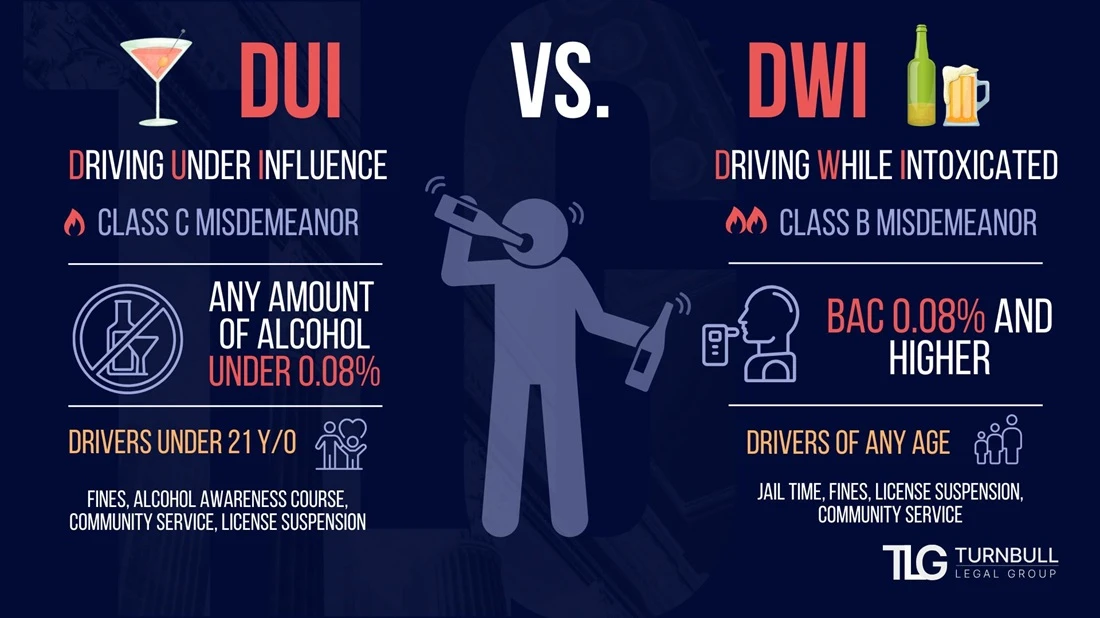You’re driving home when flashing red and blue lights appear in your rearview mirror — your heart pounds as you pull over. A simple traffic stop quickly turns into field sobriety tests, handcuffs, and the terrifying reality of a DWI or DUI charge. But what’s the difference between the two, and how could it impact your future?
The penalties for drunk or impaired driving in Texas are severe, with hefty fines, license suspensions, and even jail time on the line. Understanding the distinction between DWI and DUI could mean the difference between a harsh penalty and a strong legal defense. Keep reading to learn what sets these charges apart and what you can do to protect your rights.
DWI vs. DUI: The Quick Answer

- DWI
Stands for Driving While Intoxicated. - DUI
Stands for Driving Under the Influence.
Both are criminal offenses in Texas, but they apply in different situations based on the driver’s age and the circumstances of the arrest.
What Is a DUI in Texas?
A DUI in Texas applies mostly to drivers under the age of 21. Under the Zero Tolerance Law, if a law enforcement officer pulls over a minor and detects any detectable amount of alcohol in their system, they can be charged with a DUI, even if they are not impaired.
Key facts about a DUI charge in Texas:
- Classified as a Class C misdemeanor.
- Does not require proof of impairment — any alcohol in their system is enough.
- Penalties include fines, mandatory alcohol awareness courses, community service, and license suspension.
- This can affect their future prospects regarding college acceptances, job offers, and housing.
What Is a DWI in Texas?
A DWI in Texas is a serious criminal offense under the Texas Penal Code § 49.04. You can be charged with Driving While Intoxicated if:
- You operate a motor vehicle in public while intoxicated.
- You have a Blood Alcohol Content (BAC) of 0.08 or higher.
- You’re impaired by alcohol, drugs, or another impairing agent, even if your BAC is below 0.08.
DWI charges can lead to:
- Class B misdemeanor for first offenses.
- License suspension, community service, and fines.
- Jail time, depending on factors like a high BAC or accidents causing injuries.
- Felony charges for repeat offenders or serious incidents like DWI with a child passenger.
A DWI conviction can leave you with a permanent criminal record, impacting professional licensure, college acceptances, and job offers.
DUI and DWI Penalties: What’s at Stake?
Both offenses can increase insurance premiums, labeling drivers as high-risk drivers.
- A DWI conviction often results in harsher penalties, such as jail time, high fines, and long-term license suspension.
- A DUI charge might seem minor, but it carries significant consequences, including a criminal record that can follow a young driver into adulthood.
Can You Face Both Charges?
Yes, in some situations, particularly if the under-21 driver has a high BAC or caused an accident, they may be charged with both DUI and DWI offenses. The Texas Department of Public Safety and law enforcement will assess the blood alcohol content and circumstances to determine the appropriate charges.
When Your Freedom Is on the Line — Fight Back with Us!
Whether you're charged with driving while intoxicated or driving under the influence, Turnbull Legal Group is here to protect your rights.
Led by E.R. "Ned" Turnbull, former State District Court Judge and Chief Prosecutor, we understand the stakes and know how to fight back. Contact us to get a free case review today.




.webp)

